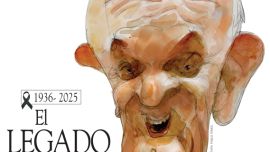Coffee lovers and novices flocked to Palermo last weekend for the two-day open-air coffee fair known as FECA (Festival de Café) – though the weather meant the clear-skied Sunday was better attended than the rainy Saturday afternoon.
FECA, an event organised by the City government’s BA Capital Gastronomy programme, took place this past weekend, running from Saturday April 27 to Sunday April 28, at the Republic of Peru Plaza located in the Palermo neighbourhood of Buenos Aires City. This latest edition of the fair was already the fourth time that the event has taken place, the first having occurred a year and a half ago in October, 2017.
Throughout the weekend, the plaza was outlined by white tented, coffee stands housed by a variety of popular local coffee shops and brands including Usina Cafetería, Tienda de Café, Cabrales, and Tostado. Tucked in the back corner, there was a small auditorium where coffee-related talks and workshops took place each day.
A small number of food trucks were also stationed at the back of the park, presumably for the coffee lovers who intended to spend the whole day walking around the fair and couldn’t be sustained by just coffee and pastries.
“The tents look a little bit like a circus or a market,” said German tourist Fabian Meise, who was on his way to MALBA when by chance he stumbled upon the fair and decided to stop by.
The middle of the park was scattered with a few small chairs and tables, but for the most part was left open as a green space for people to walk around and talk or sit on the grass and enjoy their coffee and pastries.
Within the mix of the coffee shops that were in attendance at the event, was local favourite El Gato Negro, the famous 90-year-old coffee house located on Corrientes Avenue that carries and roasts their own coffee beans and specialises in spices, teas, and coffee.
Juan Rodríguez, a porteño and the manager of the coffee shop, says that they have been involved with FECA since it first began.
“[FECA] is important because, in reality I believe that in Argentina a lot isn’t known about coffee. Argentines go to coffee bars and drink coffee without knowing what type of coffee they are drinking,” said Rodríguez.
The small auditorium, slightly larger than the coffee stands, was not far from where El Gato Negro was stationed, which allowed Rodríguez to occasionally take a glance at the programmes that were going on.
“There are people here that know a lot about coffee,” he said.
Through the dreariness that characterised most of Saturday, one workshop – which was led by Christian Buritica – taught a rain-soaked audience how to best make coffee at home.
Under the cover of the white tent-covered stage, Buritica advised the audience that the best coffee to water ratio is 1g of coffee to 16g water and that making coffee with a French Press makes your coffee softer, but more caffeinated.
Einat Rozenwasser, a journalist who started to specialise in coffee and gastronomy over the past few year, is the woman who organised and ran the programs that took place at the auditorium throughout the weekend.
“Buenos Aires is a city very much known for its coffees and its coffee culture, but in reality, until recently the coffee that was drank in coffee shops was not very good, neither was the coffee that was drank in people’s homes,” said Rozenwasser. “The idea is to change the coffee culture so we all can enjoy a better beverage, and that’s why it is important to spread the word.”
Although Saturday’s audience was largely reduced by the weather, the amount of people in attendance on Sunday made it seem as if for the next edition of the fair, BA Capital Gastronomy will need to host the event at a much bigger park.
“The audience for coffee is growing a lot, there are a lot of coffee related events now,” said Rozenwasser. “Before, we only had the fair and ‘Choose Good Coffee,’ now there is the addition of ‘la fiesta de café.’ FECA is the most notable right now, edition to edition, that is how the number of people attending is growing and now the audience for coffee is being amplified.”
Both nights ended with live music performances, but the last talk to conclude the weekend was a presentation discussing the importance of sustainability when it comes to the production of coffee. Rozenwasser said the schedule wasn’t intentionally planned that way, but added that it was certainly a good way to end the weekend.






















Comments